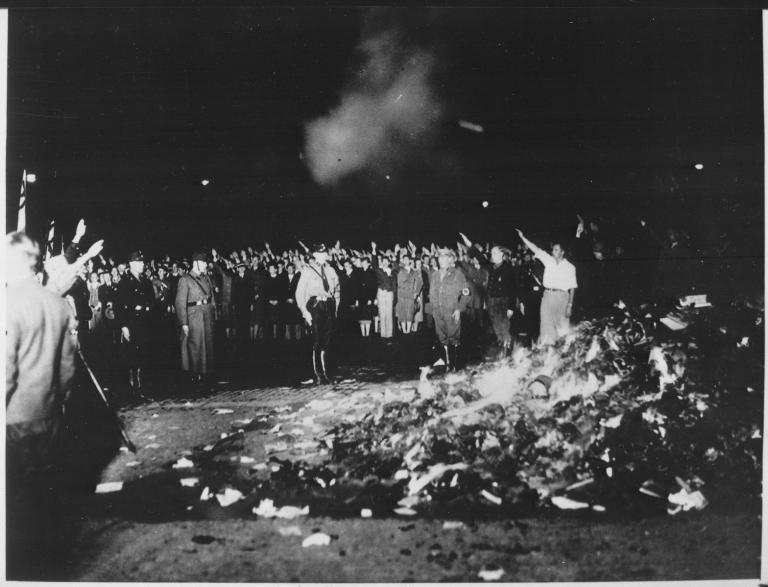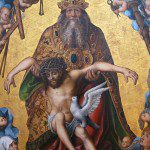
(Photo from Wikimedia Commons public domain)
I wrote this column for the Provo Daily Herald in October 1998:
“A single death is a tragedy,” said Josef Stalin. “A million deaths is a statistic.” But a visit to the Holocaust Museum in Washington, DC, gives the lie to the Soviet dictator. A million deaths is a million tragedies.
And the losses continue. Given the intellectual leadership of the Jews in Europe and, now, in the United States, we must ask ourselves what great art we are missing, that Hitler’s millions of victims might have created. Who can know what literature they or the children they were denied might have written? Would we have had a cure for cancer? And Jews were by no means the only victims of Hitler’s grisly “Final Solution” and of the war into which he plunged much of Europe and the world beyond. The ramifications of the Holocaust are literally incalculable.
The Holocaust raises the problem of evil — what theologians and philosophers call the question of “theodicy” — in its most acute imaginable form: Appalling evils suggest that, if God is all-powerful, he is not good, and that if he is good, he is not all-powerful. Many solutions have been offered to this problem, but in the face of the actual details of the Holocaust — and the Soviet “gulag” and the Armenian genocide and the Cambodian killing fields and the Ukrainian “famine” and the purges of Mao and the massacres in Rwanda and, now, the “ethnic cleansing” in the former Yugoslavia — they can seem merely shallow and glib. One thinks of Voltaire’s Candide, and of Dr. Pangloss, assuring us despite horrifying injustices and seemingly pointless suffering that this really is “the best of all possible worlds.”
“Never shall I forget that night,” writes the Nobel laureate Elie Wiesel, a survivor of the Nazi death camp at Auschwitz, “the first night in camp, which has turned my life into one long night, seven times cursed and seven times sealed. Never shall I forget that smoke. Never shall I forget the little faces of the children, whose bodies I saw turned into wreaths of smoke beneath a silent blue sky.
“Never shall I forget those flames which consumed my faith forever.
“Never shall I forget that nocturnal silence which deprived me, for all eternity, of the desire to live. Never shall I forget those moments which murdered my God and my soul and turned my dreams to dust. Never shall I forget these things, even if I am condemned to live as long as God Himself. Never.”
But is evil really the end of the story? Did Hitler win? Some Jews have seen in the “Final Solution,” which ended violently in 1945, and the rise of the Jewish state of Israel in 1948, a symbol of the triumph of good (and of God) over evil and death much like the death and resurrection of Jesus himself for Christians. They may not be entirely wrong.
The scores of biographies of Hitler that have appeared since his Wagnerian death amidst the flaming ruins of Berlin clearly demonstrate that we crave an explanation for such stunning evil — and that we are not yet satisfied that we have one. But doesn’t stunning goodness also demand explanation? Albert Schweitzer, the Buddhist emperor Asoka of India, and Mother Teresa of Calcutta (who sought only to do “something beautiful for God”) are clues, no less than Stalin and Pol Pot, to the nature of humanity and the universe.
St. Maximilian Kolbe voluntarily went to his death at Auschwitz in place of a fellow prisoner. Oskar Schindler, not a good man by traditional standards, rose to indisputable moral heroism under the Nazis and rescued hundreds of Jews. During the four years of the German occupation of France, the little southern Protestant village of Le Chambon, with an impoverished population of three thousand, saved about five thousand refugees (mostly children).
“There is none that doeth good,” says the Psalmist, “no, not one.” “All we like sheep have gone astray,” agrees Isaiah. Yet, as another Psalm declares, God has made humankind “a little lower than the angels” — or, as the Hebrew says, “a little lower than the gods.” A balanced perspective on humanity and the universe will keep both facts in view.
Posted from Phoenix, Arizona












